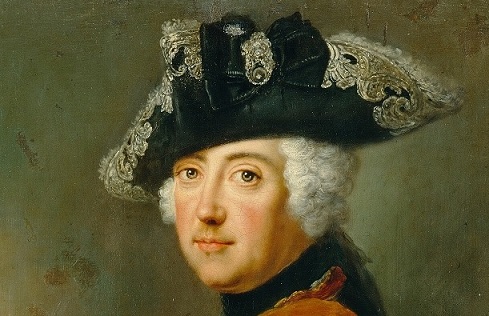
Few figures in German history cast as long a shadow as Frederick II of Prussia, better known as Frederick the Great. Ruling from 1740 to 1786, he took a modest, militarized kingdom and elevated it to the ranks of Europe’s great powers. Yet Frederick wasn’t just a warrior-king – he was also a musician, philosopher, and patron of the Enlightenment.
His reign was a fusion of military strategy, administrative reform, and intellectual engagement. Let’s dive into the life of a monarch who left a permanent imprint on German identity – and reshaped Europe along the way.
Early Life and Education
Frederick was born in 1712 to Frederick William I, the “Soldier King,” and Sophia Dorothea of Hanover. His father was obsessed with discipline, frugality, and military precision. Frederick, however, gravitated toward:
- French literature
- Philosophy
- Music (he played the flute and composed sonatas)
A tense relationship with his father climaxed in Frederick’s attempted escape, which failed. His close friend Hans Hermann von Katte was executed before his eyes. Afterward, Frederick submitted – but his Enlightenment leanings remained.
Ascension to the Throne
When Frederick became king in 1740, he immediately launched the invasion of Silesia, triggering the War of the Austrian Succession (1740–1748). It was a bold move:
- He capitalized on the chaos following Emperor Charles VI’s death.
- He defied Maria Theresa, the Habsburg heir.
Frederick’s army shocked Europe by capturing and holding Silesia – rich in resources and strategically vital.
Military Genius and the Seven Years’ War
Frederick’s most defining conflict came during the Seven Years’ War (1756–1763). Facing a coalition of Austria, France, Russia, and Sweden, Prussia was vastly outnumbered.
Key victories included:
- Battle of Rossbach (1757) against France
- Battle of Leuthen (1757) against Austria
Despite being nearly defeated multiple times, Frederick’s resilience, tactical brilliance, and luck – particularly the death of Russian Tsarina Elizabeth – allowed him to survive.
By war’s end, Prussia had cemented its status as a European great power.
Domestic Reforms and Enlightenment Ideals
Frederick earned the nickname “Philosopher King” for a reason. He corresponded with Voltaire, reformed government institutions, and embraced Enlightenment principles:
- Religious tolerance: He allowed Catholics, Jews, and Protestants to worship freely.
- Legal reform: Simplified and codified Prussian law.
- Education: Expanded schools, promoted science, and emphasized merit.
He modernized the bureaucracy, promoted economic development, and supported infrastructure projects like canals and roads.
Yet Frederick remained an absolutist. He believed in top-down reform – serving the people without sharing power with them.
Arts, Culture, and Legacy
Frederick transformed Berlin into a cultural hub:
- Built Sanssouci Palace in Potsdam, his answer to Versailles.
- Hosted philosophers, musicians, and architects at his court.
- Maintained a personal library of over 2,000 books.
He wrote poetry, played the flute daily, and even staged plays. His dual identity – general and gentleman – became a model for enlightened leadership.
Legacy and Historical Assessment
Frederick the Great’s legacy is vast:
- Military innovation influenced armies across Europe.
- His model of enlightened absolutism inspired both admiration and criticism.
- His consolidation of Prussian power laid the groundwork for German unification in the 19th century.
Controversies include:
- His wars caused massive suffering.
- He expanded censorship late in life.
- He strengthened the nobility’s grip on rural peasants.
Still, few deny his brilliance and impact. Napoleon reportedly called him “the greatest tactical genius of the century.”
Frederick the Great was more than a king – he was a builder of states, a challenger of empires, and a shaper of modern governance. His mix of militarism and intellectualism defined Prussia and continues to shape Germany’s historical self-image.
Related Topics:
Reformation and Early Modern Period – Explore the major transformations in German history from the 16th to early 19th centuries, including religious upheaval, political change, and cultural milestones.
Martin Luther and the 95 Theses – Discover how Luther’s 1517 protest against indulgences sparked the Protestant Reformation and forever altered the religious landscape of Germany and Europe.
The German Peasants’ War (1524–1525) – A major uprising of peasants and lower classes inspired by Reformation ideals, this war revealed deep social tensions in early modern Germany.
The Peace of Augsburg – Discover the Peace of Augsburg, its role in shaping Germany’s religious landscape, and how it laid the groundwork for centuries of conflict and compromise.
The Thirty Years’ War and Its Impact on Germany – This devastating conflict reshaped Central Europe, leading to massive depopulation, destruction, and long-term political fragmentation in the German lands.
The Peace of Westphalia (1648) – The treaty that ended the Thirty Years’ War established new political boundaries and is considered a foundation of modern international diplomacy.
Rise of Brandenburg-Prussia – Follow the emergence of Brandenburg-Prussia as a rising power in northern Germany, laying the groundwork for future German unification.
The Enlightenment in the German States – Learn how German philosophers, writers, and reformers contributed to the broader European Enlightenment with ideas on reason, science, and governance.
German Scientific and Cultural Achievements (18th Century) – Explore the flourishing of music, philosophy, and science in 18th-century Germany, from Bach and Goethe to Kant and Humboldt.
The Napoleonic Wars and the Confederation of the Rhine – Discover how Napoleon’s reshaping of German territories led to the end of the Holy Roman Empire and the formation of a French-aligned confederation.
The Congress of Vienna and the German Confederation – Understand how European powers redrew the map after Napoleon’s defeat, establishing the German Confederation as a loose alliance of states.
